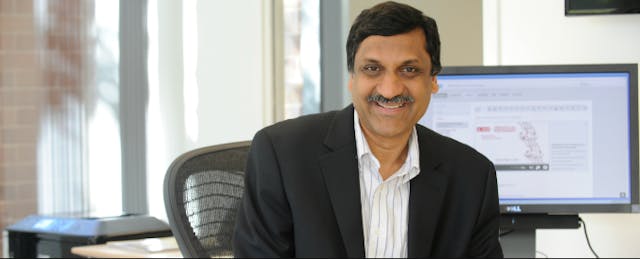EdX, the nonprofit online-education group founded by MIT and Harvard, is quietly developing a “MicroBachelors” degree that is designed to break the undergraduate credential into Lego-like components.
In December, edX won a $700,000 grant from the Lumina Foundation to support the MicroBachelors effort with the organization’s university partners. Officials from edX declined to talk about the project, saying only that it is in the early stages. But at a higher-education innovation summit last month hosted by the U.S. Department of Education, Anant Agarwal, CEO of edX, listed the project as part of the group’s long-term vision that began with its MicroMasters program. And the organization has filed a trademark for the term “MicroBachelors” as well.
“Education in five to ten years will become modular, will become omnichannel, and will become lifelong,” Agarwal said at the meeting, later explaining that omnichannel meant offering courses either online or in person. “We are going to make it so. It’s not going to happen by itself, we’re going to make it happen. Modular is good because it can create new efficiencies and new scaling and unbundling of components,” he added.
Agarwal said at the event that edX and its partner universities have together developed 45 MicroMasters degrees, low-cost online programs that cover about 25 to 50 percent of the material from a typical Master’s program. There are no admissions requirements for MicroMasters programs, and students who do well in them can use that success to help win admission to complete the full master’s at the participating institution. The concept is known as a “stackable” credential.
“We will launch MicroBachelors within the next year or two and do the same modularization with the bachelor’s degree,” he said. “We’ve already launched Global Freshman Academy with ASU, that is a precursor to the MicroBachelors.”
Arizona State University started the Global Freshman Academy with edX in 2015 to offer students a way to complete their first year of college online at a far lower cost than traditional enrollment.
Hundreds of thousands of students have shown interest in the program, says Sean Hobson, assistant vice president and chief design officer for EdPlus at ASU. But so far, few of those students have completed the full set of courses and enrolled in a traditional program, as intended.
“In terms of the numbers of students who are actually taking it as a program and transcribing those credits and applying into the university, the numbers are still pretty small,” Hobson says.
Still, he says the program is going well, and is just one of the university’s efforts at what he called “open-scale courseware,” the university’s attempt to rebrand a concept that was once known as MOOCs, or massive open online courses. He says ASU has no plans to create a MicroBachelors, however. It is not clear exactly how edX's plan for the new credential will differ from what ASU is doing.
Sanjay Sarma, vice president for open learning at MIT, also says that while his institution is not working on a MicroBachelors degree, he thinks the concept is a natural extension of micromasters, which MIT already offers in partnership with edX. “It’s more for folks who couldn’t attend college,” he said in an email interview. “Since we do need-blind admissions and cherish our time on campus, we have not pursued it.”
How would a MicroBachelors be different than, say, a two-year associate’s degree, which is arguably already half a bachelor’s degree? Sarma said that the idea behind both MicroMasters and MicroBachelors is that they are “about putting stuff that can be done online, online.” In other words, the big idea is offering a low-cost, low-risk way for students to start an undergraduate education even if they can’t get to a campus.
Efforts to reach underserved students with online options hasn’t always worked out well. In an oped in The New York Times last week, Susan Dynarski, a professor of education, public policy and economics at the University of Michigan, criticized the practice of colleges offering “credit-recovery programs” online to help students without the necessary prerequisites advance to college. She says that data shows that students who do well in the online courses do poorly in subsequent academic tests on the material. “For advanced learners, online classes are a terrific option, but academically challenged students need a classroom with a teacher’s support,” she argued.
But she praised the MIT MicroMasters approach, noting that “students must first demonstrate that they can tough it out in an online class. Only then are they admitted to a rigorous, face-to-face master’s program.”
Correction: This article originally misstated the size of the grant to edX.


